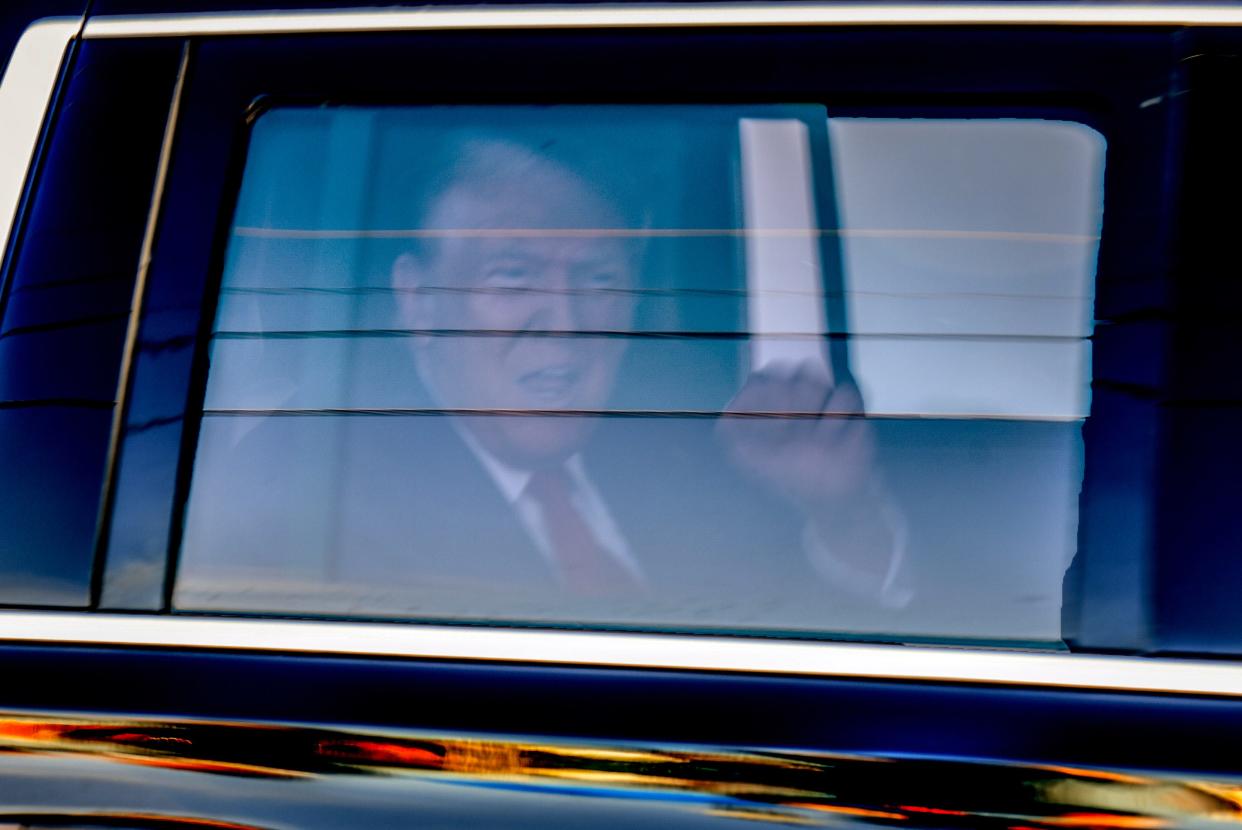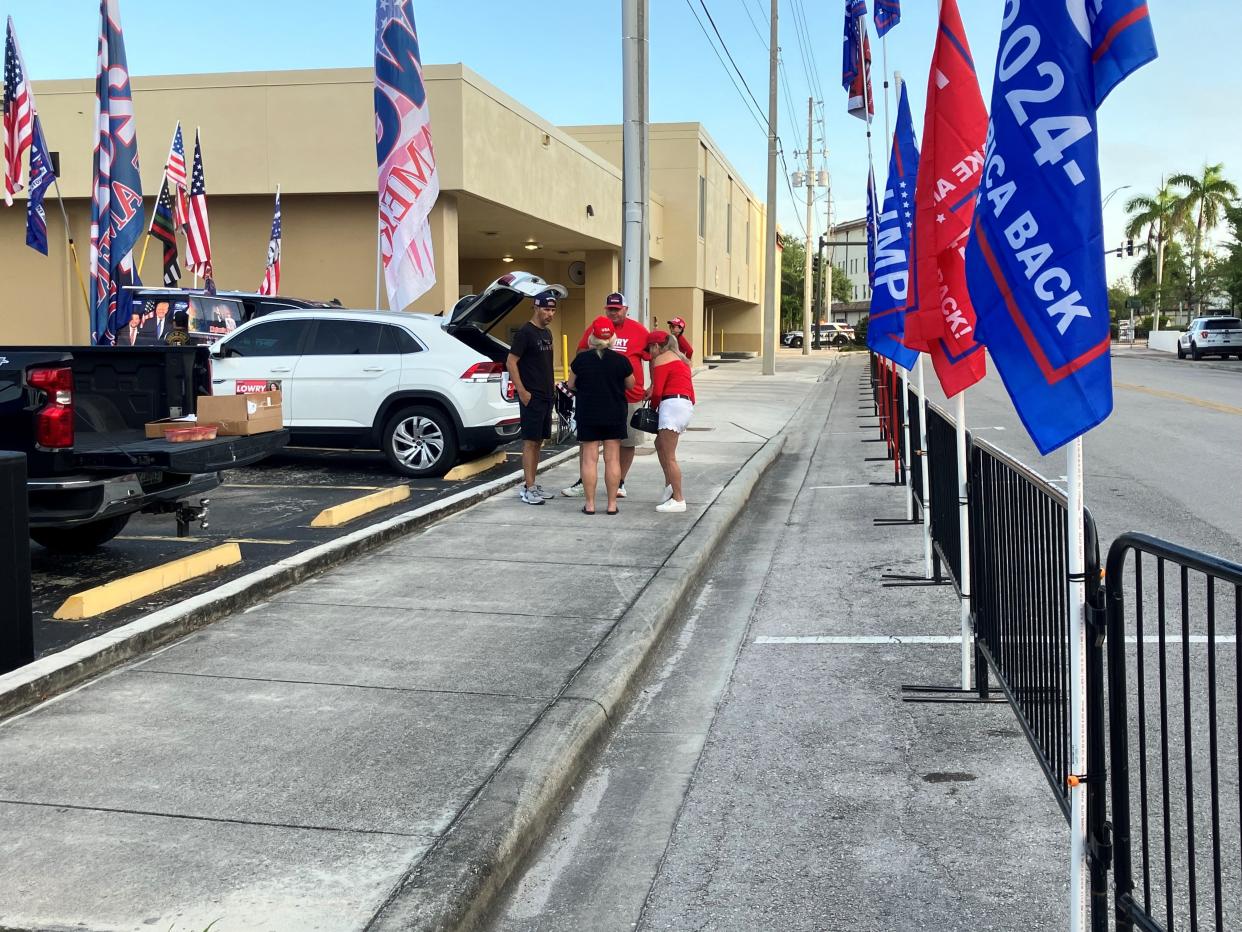Donald Trump's lawyers clash with prosecutors over proposals to dismiss charges he hoarded classified records
Prosecutors and Donald Trump’s lawyers clashed again Thursday in federal court in Florida over his proposals to dismiss charges the former president mishandled classified documents after leaving the White House.
Trump, who attended the hearing, contends he is immune from prosecution, claiming that parts of the Espionage Act prohibiting the retention of national defense records is too vague to enforce and that he converted the classified documents from classified to personal records before leaving the White House so he could keep them.
“The cobbled-together attempt by the Special Counsel’s Office fails as applied to President Trump,” lawyers Todd Blanche and Christopher Kise wrote in a filing.
But Thursday evening, U.S. District Judge Eileen Cannon, a Trump appointee, denied Trump's motions attacking the "vagueness" of the Espionage Act, while leaving the 2024 Republican frontrunner room to argue the issue again later. She didn't immediately decide his claims over the Presidential Records Act.
Justice Department special counsel Jack Smith’s team contends Trump doesn’t know what he’s talking about.
“Trump’s claims rest on three fundamental errors, all of which reflect his view that, as a former President, the Nation’s laws and principles of accountability that govern every other citizen do not apply to him,” prosecutors wrote.
Cannon also needs to set a new trial date. The judge is expected to postpone the tentative trial date of May 20 because of disputes in the case and has said it will probably be later than the prosecution’s proposal of July 8. Trump’s lawyers suggested an Aug. 12 start but urged her to postpone the trial until after the November election.
More: Judge rejects Donald Trump's vagueness argument for tossing out Florida documents charges

What charges does Trump face in the classified documents case?
Trump faces 40 counts of hoarding national defense documents at Mar-a-Lago, his Florida estate, and then conspiring with two of his employees – personal valet Walt Nauta and property manager Carlos De Oliveira – to hide them from federal authorities. Each of the three has pleaded not guilty.
More than 300 classified documents were recovered more than a year after Trump left the White House, most under subpoena in June 2022 or during an FBI search in August 2022.
"The classified documents Trump stored in his boxes included information regarding defense and weapons capabilities of both the United States and foreign countries; United States nuclear programs; potential vulnerabilities of the United States and its allies to military attack; and plans for possible retaliation in response to a foreign attack," the indictment said. "The unauthorized disclosure of these classified documents could put at risk the national security of the United States, foreign relations, the safety of the United States military, and human sources and the continued viability of sensitive intelligence collection methods."
Trump is charged with 32 counts of willful retention of national defense information, along with conspiracy to obstruct justice, withholding a document, corruptly concealing a document and making false statements.
Trump says he is immune and that he designated classified records as 'personal'
Trump posed several arguments for Cannon to dismiss the charges. For one, Trump contends he is immune from prosecution because decisions about moving the documents happened when he was president.
The Supreme Court is set to hear arguments about immunity April 25 in Trump’s other pending federal case, on charges he tried to steal the 2020 election. A federal judge and the D.C. Circuit Court of Appeals previously ruled Trump has no shield from federal charges.
Trump has also argued he designated the hundreds of records with classified markings on them as personal records so he could keep them after leaving the White House. And he contends that, under the Presidential Records Act, any disputes over records should be handled as a civil matter rather than criminal.
Trump also argues the section of the Espionage Act being wielded against him for storing classified records is unconstitutionally vague.
“As the Court already observed, President Trump was ‘once the country’s chief classification authority’” and his “retention of the documents was not ‘unauthorized’” because “he designated them as personal records," Trump's lawyers wrote in a filing.

Prosecutors say Trump's 'alchemy,' turning classified documents into personal records, is 'false'
Prosecutors opposed each of Trump’s demands to dismiss the case.
The Espionage Act’s prohibitions are clear and a former president should understand the paramount importance of protecting the country’s national security and military secrets, prosecutors argued.
“Trump’s vagueness argument is meritless,” prosecutors wrote in a filing. “The statute’s prohibitions are clear.”
Prosecutors also said the documents are “indisputably presidential,” rather than personal as Trump claims. Prosecutors said Trump’s argument that records are “transformed into ‘personal’ records by the alchemy of removing them from the White House is false.”
The Presidential Records Act "does not exempt Trump from the criminal law, entitle him to unilaterally declare highly classified presidential records to be personal records, or shield him from criminal investigations – let alone allow him to obstruct a federal investigation with impunity,” prosecutors wrote in a court filing.
This article originally appeared on USA TODAY: Trump lawyers, prosecutors clash fight over classified records charges
